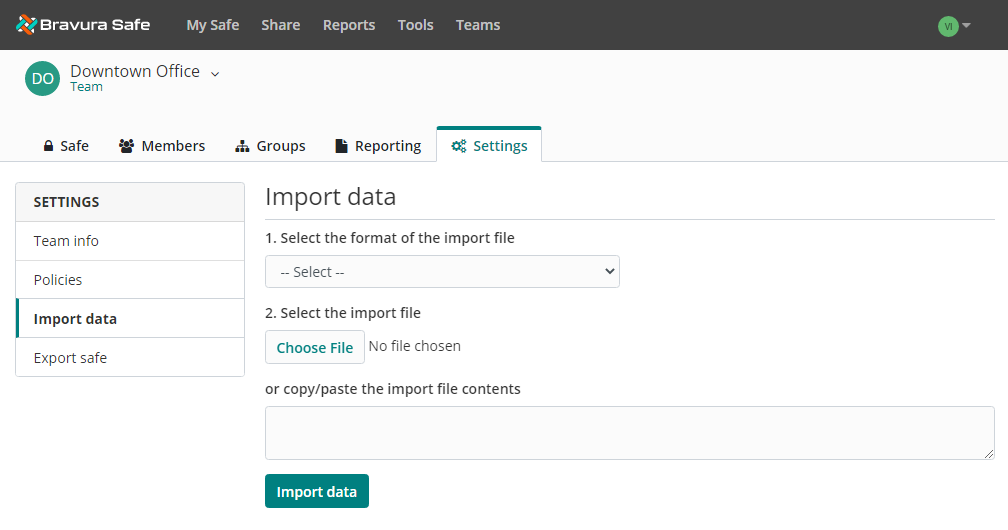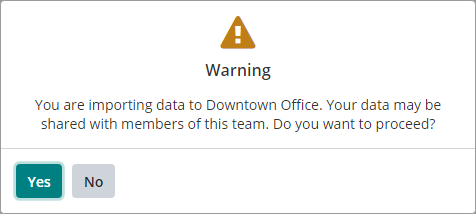Import data to an existing Team
Note
This task can be performed by a Team owner/admin using the web interface.
Note
Make sure that you are using the right format depending on whether you are importing data to a Team safe or your personal safe. If you are importing to your individual My Safe, see Import to your personal safe.
CSV files will only handle logins and secure notes. If you need to import or export identities and cards as well, use JSON.
As the owner a Team, you can import data via an exported .csv or .json file. Most common password manager tools support exporting via CSV or a JSON format.
If you have exported from a password manager not supported out of the box, manually condition a .csv or .json file before importing the data to Bravura Safe:
| 1Password (1pif) | Firefox (csv) | Passpack (csv) |
| 1Password 6 & 7 Windows (.sv) | F-Secure KEY (fsk) | Password Agent (csv) |
| 1Password 6 & 7 Mac (csv) | GNOME Passwords and Keys/Seahorse (json) | Password Boss (json) |
| 1Password (1pux) | Kaspersky Password Manager (txt) | Password Dragon (xml) |
| Ascendo DataVault (csv) | KeePass 2 (xml) | Password Safe (xml) |
| Avast Passwords (csv) | KeePassX (csv) | PasswordWallet (txt) |
| Avast Passwords (json) | Keeper (csv) | Psono (json) |
| Avira (json) | LastPass (csv) | RememBear (csv) |
| BlackBerry Password Keeper (csv) | LogMeOnce (csv) | RoboForm (csv) |
| Blur (csv) | Meldium (csv) | SafeInCloud (xml) |
| Brave (csv) | mSecure (csv) | SaferPass (csv) |
| Buttercup (csv) | Myki (csv) | SecureSafe (csv) |
| Chrome (csv) | Microsoft Edge (Chromium) (csv) | SplashID (csv) |
| Clipperz (html) | Nordpass (csv) | Sticky Password (xml) |
| Codebook (csv) | Opera (csv) | True Key (csv) |
| Dashlane (json) | Padlock (csv) | Universal Password Manager (csv) |
| Dashlane (csv) | Passbolt (csv) | Vivaldi (csv) |
| Encryptr (csv) | PassKeep (csv) | Yoti (csv) |
| Enpass (csv) | Passky (json) | Zoho Vault (csv) |
| Enpass (json) | Passman (json) |
Create a UTF-8 encloded plain text file with the following header as the first line in the file:
collections,type,name,notes,fields,reprompt,login_uri,login_username,login_password,login_totp
For example:
collections,type,name,notes,fields,reprompt,login_uri,login_username,login_password,login_totp "SocMed,Marketing",login,Twitter,,,0,twitter.com,me@example.com,password123, "Finance",login,My Bank,"Bank PIN is 1234","PIN: 1234",0,https://www.rbc.com/home.jhtml,chris.brown,password123456, "Finance",login,website,,,0,https://www.website.com/support/login.asp,betty@bravurasecurity.com,mypassword,TOTPSEED123 "SocMed",note,My Note,"This is a secure note.",,0,,,
Note
When importing this file, select Bravura Safe (csv) for the file format.
Create a UTF-8 encoded plaintext file in the following format:
{
"collections": [
{
"id": "xxxxxxxx-xxxx-xxxx-xxxx-xxxxxxxxxxxx",
"organizationId": "yyyyyyyy-yyyy-yyyy-yyyy-yyyyyyyyyyyy",
"name": "My Collection",
"externalId": null
},
...
],
"items": [
{
"id": "vvvvvvvv-vvvv-vvvv-vvvv-vvvvvvvvvvvv",
"organizationId": "yyyyyyyy-yyyy-yyyy-yyyy-yyyyyyyyyyyy",
"folderId": "zzzzzzzz-zzzz-zzzz-zzzz-zzzzzzzzzzzz",
"type": 1,
"reprompt": 1,
"name": "Our Shared Login",
"notes": "A login for sharing",
"favorite": false,
"fields": [
{
"name": "custom-field-1",
"value": "custom-field-value",
"type": 0
},
...
],
"login": {
"uris": [
{
"match": null,
"uri": "https://mail.google.com"
}
],
"username": "myaccount@gmail.com",
"password": "myaccountpassword",
"totp": otpauth://totp/my-secret-key
},
"collectionIds": "xxxxxxxx-xxxx-xxxx-xxxx-xxxxxxxxxxxx"
},
...
]
}Note
When importing this file, select Bravura Safe (json) for the file format.
Warning
Import to Bravura Safe cannot check for duplicates compared to items already in your safe. Importing duplicate files will create duplicate safe items.
Log in to Bravura Safe via the web interface.
Click Teams.
From the Team drop-down, select the Team into which you want to import data.
Click the Settings tab.
Select Import Data from the SETTINGS menu.

From the Select the format of the import file drop-down, choose the file format of your existing data.
Click Choose File and add the file to import (or copy/paste the contents of your file into the input box).
The file name appears below the Choose File button.
Click Import Data.
A confirmation message appears.

Click Yes to complete your import.
Warning
After a successful import, delete the import source file from your computer. This will protect you in the event your computer is compromised.